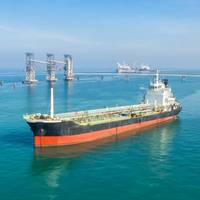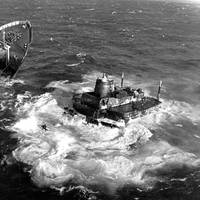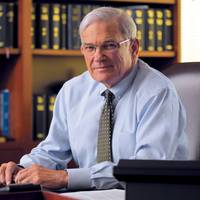OCIMF Restructures to Focus on High-Impact Risks

The Oil Companies International Marine Forum (OCIMF), the voluntary association of oil companies, announced it has overhauled its committee structure to focus its resources on identifying and mitigating issues of highest-risk to its members and to the marine industry. While its scope of operations and remit remains the same, OCIMF’s strategy places a renewed emphasis on the way it identifies, analyses and assesses the issues that have the biggest impact on the safety of lives, the natural environment and property.
Today in Maritime History: Grounding of the Supertanker Torrey Canyon
On the world stage, the grounding of the supertanker TORREY CANYON on Pollard’s Rock in the Seven Stones reef between Cornwall and the Scilly Isles is more significant than the 1989 EXXON VALDEZ oil spill. The TORREY CANYON was one of the first tankers large enough (120,000 tons capacity) to be designated a supertanker. It was also the first loaded supertanker to spill its entire cargo. After salvage efforts failed and the oil flow increased, the British Government decided to bomb the ship in an attempt to burn the oil. This was a radical decision because the wreck was outside the three-mile territorial sea limit prevalent at that time. The Royal Air Force had difficulty hitting the ship, so the Royal Navy sent its planes in.
IOPC Funds Is Now 40!
The International Oil Pollution Compensation Funds (IOPC) have provided help in 150 oil spill incidents since its inception in 1978. Denmark has been a member of these crucial organisations since the beginning.According to a release from Danish Maritime Authority (DMA), IOPC-funds began with the Torrey Canyon oil spill disaster in 1967, which clearly demonstrated the need for an effective international regime to pay for the massive damage caused by major oil spills.Director, Maritime Regulation and Legal Affairs in the DMA, Kristina Ravn, said: “Oil spills occur from time to time and that’s why the IOPC-funds remain important, ensuring due compensation for the victims.
IMO Animating 70 Years of Shipping
70 years of helping international shipping become safer, more secure and develop a greener environmental footprint – that's what International Maritime Organization (IMO) is celebrating in 2018, with a series of events and commemorative productions being released throughout the year.The latest is a short animated film which shows how IMO has developed mandatory international regulations covering almost every aspect of shipping. As a result, modern shipping conforms to the highest practicable standards and is the safest, cleanest and most efficient way to move goods around the world.The animation traces IMO's voyage from the 1948 United Nations conference in Geneva…
IMO’s Legal Committee to Promote HNS 2010
International Maritime Organization (IMO)'s Legal Committee is expected to consider adopting a resolution to encourage the ratification and implementation of the 2010 HNS Convention, when it meets for its 104th session (26-28 April). Norway recently became the first country to become a Contracting State to this key compensation treaty covering the transport of hazardous and noxious substances (HNS) by ship. Also up for consideration is a draft Assembly resolution to allow for the delegation of authority to issue insurance certificates under the CLC and the HNS Convention. The Committee is also expected to confirm the addition of mandatory insurance certificates into the consolidated draft list of certificates and documents required to be carried on board ships, 2017.
Successful Cooperation for Safe Sea Transport of Oil
The story of how that incident served as a catalyst for positive change is told in a new exhibition which was launched on Monday (16 January) at the headquarters of the IMO, the United Nations agency with responsibility for the safety and security of international shipping and the prevention of pollution from ships. A series of panels chart the collaborative work which has resulted today in a comprehensive regulatory framework, a demonstrably improved shipping industry, good systems of preparedness and response and adequate compensation for those affected by spills. Demand for oil remains strong and shipping remains the most effective means of meeting that demand.
IMO Exhibition on Safe Sea Oil Transport
The 50 years since the grounding of the tanker Torrey Canyon in 1967 have seen dramatic and sustained reduction in major oil spills from ships, thanks to cooperation between Governments and industry. The story of how that incident served as a catalyst for positive change is told in a new exhibition which was launched on Monday (16 January) at the headquarters of the International Maritime Organization (IMO), the United Nations agency with responsibility for the safety and security of international shipping and the prevention of pollution from ships. A series of panels chart the collaborative work which has resulted today in a comprehensive regulatory framework…
Exhibition on Risk of Oil Pollution from Ships
The International Group is collaborating with the International Maritime Organization (IMO), International Oil Pollution Compensation Fund (IOPC) Funds and other industry organisations to produce an exhibition at the IMO to mark the achievements of the international community over the past 50 years to achieve a sustained reduction in major oil spills from ships; to establish effective systems for preparedness and response if there is an incident; and to create a comprehensive mechanism for providing compensation. In 1967, the grounding of the Torrey Canyon focused the world's attention on the risks and environmental impact of major marine oil spills.
Disasters at Sea & Their Impact on Shipping Regulation

The history of marine safety is soaked in water and written in blood. “I think that most people will tell you that changes in marine safety are almost exclusively disaster-driven,” agrees Dr. Josh Smith, a professor at Kings Point and interim director of the American Merchant Marine Museum. It hasn’t always been that way. Actually, it’s been worse. Despite some efforts early on to exert some control over shipping practices, going to sea has been accepted as a risky undertaking as long as man has floated vessels.
Oil Spill Clean Up: Your Response is Required
The government has a plan for responding to your oil spill. Do you? In February, due to a collision between a tug boat and a tank barge, approximately 31,500 gallons of crude oil were released into the Mississippi River. The Mississippi River was closed down for two days and the residents of St. Charles Parish sat on pins and needles, waiting to find out if their drinking water would be contaminated. Thankfully, the drinking water was not affected, there were no reports of serious environmental damage and the River re-opened several days after the closure. It doesn’t always and happily, however. Unfortunately, the potential for a spill like this is always present when operating vessels.
Places of Refuge

The concept of force majeure has been broadly accepted since mariners initially encountered the perils of the sea. Persons and governments ashore have been obligated, at least by natural law, to accept and succor those in distress at sea. Concomitant with force majeure is the notion of providing a ship in distress with a place or port of refuge. A place of refuge is where a ship could go to avoid or ameliorate the peril and then depart at the earliest opportunity. While the original need for force majeure and a place of refuge was to reduce the risk to the lives of those on board the ship…
A Class Act Robert D. Somerville, ABS Chairman

As Robert D. Somerville, ABS Chairman, winds down his career with the American Bureau of Shipping, he shares with Maritime Reporter more than four decades of insight and perspective on the evolution and future of class. Earlier this month you were honored by the US Coast Guard Foundation at a black tie event in NY City. You have received many honors over your career: in your mind what makes the recognition from the Coast Guard Foundation special or unique? ABS works with the maritime administrations of more than 125 countries…
ECDIS Ltd included in MCA Training Provider List
ECDIS Ltd included in MCA Training Provider List. The sad consequences of the grounding of ships have been all too commonly seen on television screens world-wide. Ships such as Torrey Canyon, Exxon Valdez and Costa Concordia have become household names in recent years, and the consequences for the environment, the loss of lives, ships and cargoes, together with the costs to insurance companies, have been all too clear for media audiences all around the planet. The UK government, through the MCA (Maritime and Coastguard Agency) has responded to a call from the IMO (International Maritime Organization) for all ships of 500 tons or more to be fitted with ECDIS within a sliding timescale and for the deck officers of those ships to be carefully trained in the use of ECDIS.
Legal: Misplacing the Place of Refuge
On December 30, 2000, the tanker Castor was underway in the western Mediterranean Sea en route from Constanza, Romania to Lagos, Nigeria, carrying 29,470 tons of unleaded gasoline. During a fierce winter storm, the ship developed a 22-m long crack across its main deck between frames 72 and 73, approximately midway along its 183.5 m length. For the next 24 days, the tanker fruitlessly sought permission to enter sheltered coastal waters of nations littoral to the Mediterranean. Its requests were rebuffed successively by Morocco, Spain, Gibraltar, Algeria, Tunisia, France, Italy, Malta, and Greece. Finally, on January 22, 2001, the cargo remaining on board was successfully lightered during a high seas transfer in international waters near Malta.
Coast Guard and Anti-Pollution Vessels from Rolls-Royce
More and more authorities are specifying Rolls-Royce ship designs and equipment for coastguard and anti-pollution vessels. Maritime states are increasingly aware of threats to their coastlines and exclusive economic zones (EEZ). The nature and seriousness of the threats varies from state to state. They may include fisheries control and prevention of illegal fishing, emergency towing of ships with engine or steering failure which represent a pollution hazard if they drift ashore, and pollution control and clean up should the worst happen. In addition come a host of other coastguard functions. Some countries prefer to split their various coastal protection and EEZ management functions among different types of vessel.
WQIS Marks 30th Anniversary
The U.S. has the most stringent, comprehensive marine pollution laws of any country on the planet. The last 30 years have marked an evolution from little legal enforcement to strict liability for marine pollution. One company, WQIS, a provider of marine pollution liability insurance in the U.S., celebrates its 30th anniversary this year. Two events proved pivotal in developing the United States' liability enforcement of marine pollution laws. In 1967, the Torrey Canyon spill off the Scilly Isles in England provided some of the most shocking images ever seen in marine pollution cleanup. Faced with an overwhelming spill and the inability to contain it, Royal Air Force fighter planes dropped napalm bombs in an effort to burn off the oil and sink the ship.
ITOPF Takes Heyerdahl Award
The International Tanker Owners Pollution Federation (ITOPF) last night was awarded the prestigious Thor Heyerdahl International Environmental Award, presented by the Norwegian Shipowners Association. Accepting on behalf of ITOPF was Dr. Ian White, the group’ Managing Director and a marine biologist who has been with the organization since 1977. ITOPF has, since being established in 1968 in the wake of the Torrey Canyon accident, taken an advisory role in the event of oil spills around the globe, sharing lessons learned from past spills and providing detailed information regarding the characteristics of certain products once they enter the sea environment.





